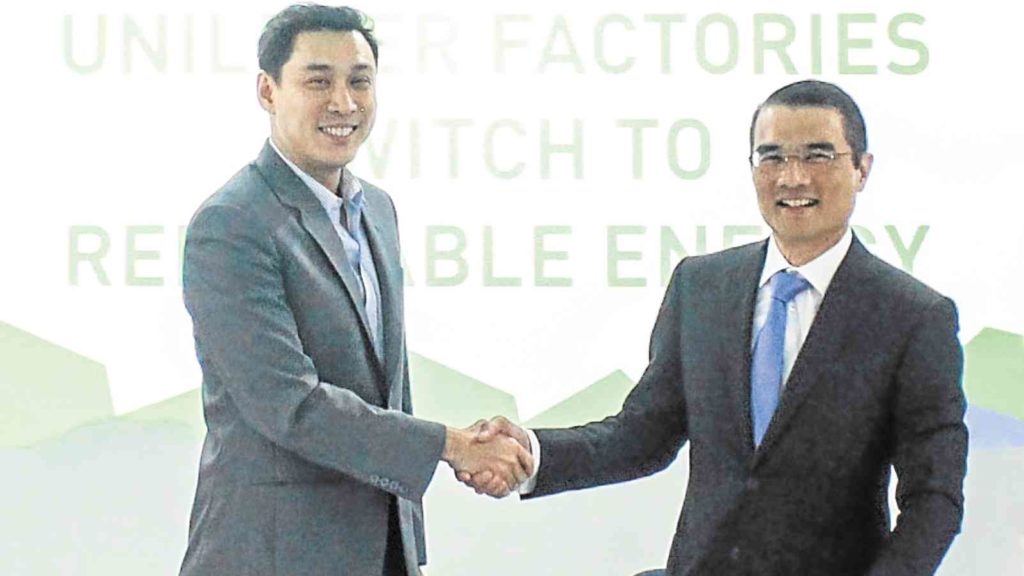Green-minded firms tidy up their businesses
The term “greenwashing” was coined by an environmentalist in the 1980s to describe the massive use of trimedia, via shrewd advertisements, to hide moneyed businesses’ dirty environmental records behind claimed sustainability efforts.
With the onset of social media, however, customers have become more attuned to a company’s business dealings. The demand for companies to be upright corporate citizens, if unmet, could break a company.
First Gen Corp. chair and chief executive Federico R. Lopez remembers his conversation with Paul Polman, chief of global brand Unilever. “I recall having breakfast with [Polman] where he talked about [Unilever Sustainable Living Plan], he said: ‘We’re doing this not because it’ll make us feel good but because my consumers, especially the millennial consumers, are demanding it and will continue to do so through life.’”
Polman is referring to his campaign against climate change, one that drives the company he has led for almost a decade to make good on its promises while protecting balance sheets.
Globally, Unilever has set a target of sourcing all its energy needs from renewable energy by 2030.
Its Philippine office is already on the right track. Unilever Philippines’ factory operations, in fact, will be 100 percent powered by renewable energy by 2018.
Unilever signed in May an agreement with First Gen, through licensed retail electricity supplier First Gen Energy Solutions Inc., to source the energy needs of its Paco and Pasig facilities from the power generators’ renewable energy plants. Unilever’s Cavite facility is already running on 100 percent geothermal energy.
“Sustainability is not just a buzzword for us at Unilever … To create a lasting positive impact necessarily means that we must be mindful of everything we do—including choosing the sources of energy that don’t compromise the present or future generations of Filipinos to power our operations,” Unilever Philippines chair Benjie Yap said during the agreement signing.
Tapping renewable sources to energize its facilities meant that the company was able to decrease its carbon emissions by 31 percent. The recent agreement with First Gen would allow it to further reduce its carbon footprint by 91 percent in 2018.
Lopez said Unilever’s strategy was to be admired since it “takes steadfast long-term vision and discipline to stay the course—committed to that cause in a world where shareholders, competitors, and other stakeholders place so much short-term pressure on revenues, returns, net income, and share prices.”
He noted companies fall by the wayside “to the point that there’s so much emphasis on doing the wrong things for society and the planet and subsequently greenwashing it away with nice words and ad campaigns.”
He said First Gen had its wake-up call when Super Typhoon Yolanda struck the Visayas in November 2013. The firm’s geothermal plants faced massive destruction, affecting the livelihood of more than 700 of its people and the energy sources of millions.
Yolanda has become, through the years, the story of heartrending destruction in the face of massive environmental degradation.
“Immediately in its aftermath, we suffered the angst, fear, and pain of many of them who lost their hard-earned assets, friends and loved ones. Despite that, all of them quickly regained composure and became the backbone of a massive rescue and rehabilitation effort, not only of our plants but of the whole island of Leyte where we mobilized aircraft, barges, helicopters, generation sets, and heavy equipment to keep supply lines open,” Lopez said.
Today, the facilities managed by First Gen’s Energy Development Corp. in the Visayas can withstand winds with strengths of up to 300 kilometers per hour.
“Yolanda four years ago was our wakeup call that so much of our world had changed irreversibly,” Lopez said.
This was also the reason why, just a year ago, First Gen promised it would not build nor invest in coal-fired power plants.
In a speech before First Philippine Holdings Corp. (FPH) stakeholders, Lopez said: “FPH and its subsidiaries will not build, develop or invest in any coal-fired power plant. There are alternatives that do not mortgage the future of our children and our planet. These are extraordinary times that call for extraordinary change and everyone must shift to think about the quickest route to a decarbonized economy.” Lopez is also chair of FPH, the parent company of First Gen.
Besides its economic and social contributions, FPH companies have also contributed so far P92.8-million worth of environmental initiatives including, among others, the protection of 170,494 hectares of natural forests.
Lopez said if the planet should stay livable, “global emissions need to peak no later than 2020 and we’ve got to be off carbon by 2050 if we want to stay within the 2 degrees Celsius of warming.”
He said fast-moving technology, one that First Gen has embraced, has helped reduce the world’s carbon footprint. “Renewables like solar and wind are dropping fast and installations are doubling every 5 years. At this rate, renewable energy will approach 100 percent by 2050.”
But most laudable of the efforts to combat climate change was the firms’ determination to include in their business agenda this task, he said.
“All these actions, while seemingly culminating at the same point in time, also simply reflect our long held values, and the way we have always preferred to do business. We recognize that, more than ever before, we are all, indisputably, in this together,” Lopez said.


